Diarrhoea and other gastrointestinal problems can be reduced with cat food for sensitive stomachs. Furballs may be reduced, and vomiting may be prevented.
The ingredients usually include higher quality ingredients, and the amount of grain and other ingredients likely to be allergens or trigger sensitivities are minimised. It’s also a good idea to look for ones that don’t have too many preservatives, additives, or artificial ingredients.
Sensitive Stomach: What Are The Symptoms?
Cat food that is specially formulated is generally more expensive than cat food that is plain and straightforward.
To keep costs down and the kitty in the best possible shape, it is essential to identify if your cat’s stomach is sensitive or if it is simply a passing condition. It would help if you were on the lookout for the following symptoms:
Throwing up
Vomiting is one of the most apparent signs of a cat’s sensitive stomach. Something must be wrong with your cat if it is vomiting. The timing, consistency, and food your cat ate the day your cat vomits should be monitored.
Generally, you don’t have to worry if your cat gets sick only once in a blue moon. Your cat may have a sensitive stomach or a more serious health issue if vomiting becomes a regular occurrence or if it develops a pattern.
Inactivity/no food intake
If your cat is not eating much, they may be getting fed elsewhere, not like the food you offer, or the weather might make them less hungry. In isolation, this could mean anything – they could be getting fed somewhere else, they may dislike the food you offer, or they could not be hungry.
Stomach problems include vomiting, being off their food, and having diarrhoea and gas. These symptoms can determine whether they are merely sensitive or suffering from a severe health problem based on the severity and duration of the condition. Keep an eye on your cat if they suddenly stop eating. Most cats cannot afford to lose a lot of weight at once!
Diarrhoea
You should consult your veterinarian if your cat has diarrhoea due to a sensitive stomach or underlying condition. The best way to determine food sensitivity is to record the symptoms after eating certain foods.
The problem may be more severe if diarrhoea lasts longer than a day or two or if the poop contains blood. It might just be a bug or an underlying health problem.
Excessive gases
Digestion produces gas as a byproduct. The symptoms of your cat’s gas may indicate sensitivity if they are beyond normal or occur in conjunction with other symptoms.
Changing your cat’s diet can quickly alleviate the issue if you’ve kept a note and identified the culprits.
Is There Anything That Might Cause Sensitive Stomachs?
The symptoms have been identified, but you want to find the root cause. Can you think of any everyday causes? It would be best if you start by checking these most likely causes:
Intolerance to food
It is possible for your cat to have a food intolerance, just as some humans do. A cat that has never suffered from an intolerance or allergy can develop one later in life, even if it has never been ill. Artificial colourings, seafood, corn products, meat by-products, dairy products, preservatives, and artificial colourings are all common intolerances.
Food intolerance can cause poor digestion, vomiting, and gas, but it might also lead to runny noses, itchy eyes, sneezing, coughing, excessive scratching, and ear problems.
Hairballs
Cats vomit mainly because of hairballs. When your cat passes a hairball more than once, you may think he has an ongoing issue, is sensitive, or has an intolerance. As a result of grooming, excess fur accumulates and is disposed of naturally, albeit disgustingly.
Vomiting may be the only symptom of hairballs being released from your cat. Your cat is most likely vomiting without any other symptoms if it sheds a lot or is long-haired.
Consuming garbage
The species eats weird stuff such as string, wool, feathers, and other bizarre things. During their daily activities, cats are often attracted to play and kill strands of wool, which can lead to digestive problems. In addition to causing sensitivity in the stomach, eating such items can cause indigestion.
Food Types
Instead, excess tuna, liver, or dairy does not cause a food intolerance like a reaction to colourings or additives.
The consumption of cheese, yoghurt, or milk can result in a mess for cats who are lactose intolerant. Overconsumption of tuna and liver can lead to heavy metal poisoning and vitamin A toxicity, respectively. You might be able to determine the cause of sensitivity by identifying which food is causing it.
Taking on too much food at once
All of us experience it from time to time! There is a possibility that your cat is not sensitive at all – they may just be devouring it too quickly.
Sometimes, the brain takes a few minutes to realise that hunger has been satisfied, but someone may already be overstuffed by that time. On the other hand, a quadruped will lose the extra weight faster because the throat is positioned more horizontally, making a burp more likely to cause spillage.
Sensitivity might be caused by eating too quickly! Slow-feed cat bowls might solve the problem if you think eating too fast is a problem.
Changes associated with ageing
Some of the things we used to be able to do or handle when we were younger we cannot do or handle now. The same is true for cats to a certain extent. You might find that your cat has a sensitive stomach due to age-related changes.
Senior cat food is a familiar sight on the market. This is because your cats need to change as they age. Their diets should contain:
- More protein.
- Higher concentrations of vitamins and minerals.
- Smaller chunks of food that are easy to absorb.
Age-related problems could affect your cat’s ability to absorb or keep down food. As food is harder to chew, it may be swallowed in larger pieces, resulting in a long time in the stomach when there is active digestion, leading to possible vomiting.
Cat Foods That Are Best For Sensitive Stomachs
1. Smalls Fresh Ground Cow Raw Cat Food – Best Overall
Smalls Fresh Raw Ground Cow Cat Food is our choice for the overall best food for cats with sensitive stomachs if you have a cat with a sensitive stomach. 90% of the ground beef in this beef-flavoured cat food is lean, and 10%of it is cow heart and liver. In this cat food, there are no unnatural fillers or questionable chemicals that can upset a cat’s stomach.
Low carbs and high protein make Smalls Best Cow Ground an ideal choice. The best part is that it contains no artificial flavours, colours, or preservatives that might upset your cat’s sensitive stomach. Your cat will receive high-quality, natural food, giving you peace of mind.
Cats need nutrients including phosphorus, calcium, taurine, and sodium, all found in Smalls Best Cow Ground cat food. In this cat food recipe, green beans, peas, and spinach replace grains as fillers. These are healthy foods for cats.
We recommend Smalls Best Cow Ground cat food for cats with sensitive stomachs. In addition to being natural, it is well tolerated by cats with sensitive stomachs, so it is our top pick for this product.
Pet stores do not sell Smalls cat food. Online subscriptions are available for this cat food. You will receive a subscription box filled with natural cat food based on the information you provide about your cat on the company’s website.
Some cat owners may be put off by Small’s pricing and subscription requirements. Subscribing to this brand of cat food is well worth it, however, because it’s among the best money can buy.
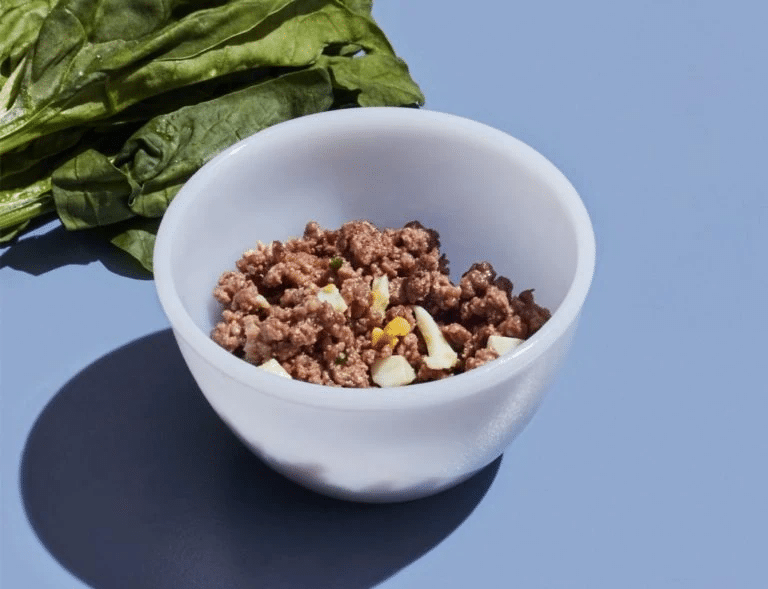
2. Cat Chow Sensitive Stomach Gentle Dry Cat Food – Best Value
Cats with sensitive stomachs often suffer from dry skin and poor coat condition, in addition to an upset stomach. It contains prebiotic fibre and probiotics in its main ingredient, turkey by-product meal, formulated for cats with sensitive stomachs. Additionally, these can improve coat conditions as well as gut health. Omega-6 fatty acid provides further support.
Artificial colours and flavours are not present in the natural ingredients. To keep the price low, the manufacturers have to compromise on some areas to make the food affordable, making it our recommendation as the best cat food for sensitive stomachs.
Leftover carcasses and other parts of the slaughtered turkey are the main ingredients of turkey by-product meals. Protein content can vary from part to part of the animal. Although this food contains some grains, it is an inexpensive dry food that may benefit your cat if it needs a probiotic boost.
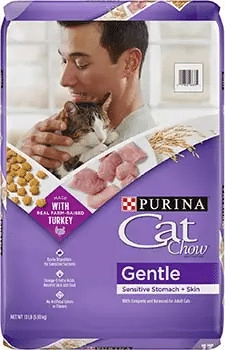
3. Hill’s Science Diet Adult Sensitive Stomach & Skin
Featuring chicken as its main ingredient, Hill’s Science Diet Adult Sensitive Stomach & Skin has rice, corn gluten meal, and brewers rice as its secondary ingredients.
Fructooligosaccharides (FOS) and vitamins are added to this product. Ginger and asparagus, among other ingredients, contain naturally occurring prebiotics called FOS. Your cat’s gut uses FOS as a food source for good bacteria. A cat’s gut is dominated by good bacteria such as lactobacillus and bifidobacterium.
Including prebiotics in cat food is essential if the cat has a sensitive stomach, and FOS is a natural source of prebiotics. There are specific alternatives on the list that are cheaper, but this one uses corn and other grains and is more expensive.
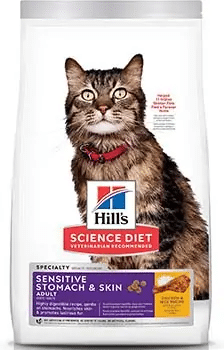
4. Nutro Wholesome Essentials Sensitive Cat Food
Chicken is the main ingredient in Nutro Wholesome Essentials Sensitive Cat Food. This food is also free of GMO ingredients, corn, and soy. It is essential to distinguish between food sensitivities and allergies.
There is no danger in them, but the body cannot digest and process food properly, leading to gastrointestinal complaints. There may be a problem with your cat’s enzymes, or they may be sensitive to certain compounds used in preservatives and additives. Even though intolerance isn’t life-threatening, it can be painful and unpleasant for your cat and make your litter tray smell worse.
This is the best cat food for sensitive stomachs as it is reasonably priced, prevents sensitivities to artificial ingredients, and cats enjoy it. The only problem is that not all ingredients are considered top-quality – brewer’s rice and pea protein, for example, provide protein. Still, plant protein is not as beneficial or bioavailable for cats as meat protein.
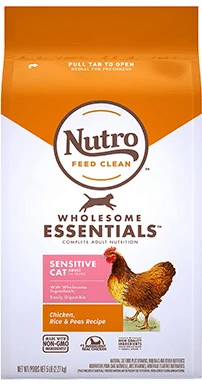
5. Purina One Sensitive Skin & Stomach Dry Cat Food
Turkey and chicken by-product meals are the main ingredients in Purina One Sensitive Skin & Stomach Dry Cat Food. The turkey will be more at the bottom of the ingredient list when cooked and prepared because it is the untreated, pure form of turkey.
By-products of chicken are a concentrated form of turkey, which means they have a high protein content, but they are by-products. As a result of slaughtering and processing meat for other foods, by-products are left over. The protein content may be lower than other, more beneficial, named parts of the meat, even if it is perfectly safe.
It contains omega fatty acids, which will improve the health and quality of the coat, and antioxidants, which will remove toxins. A reasonable price is also charged for the food.
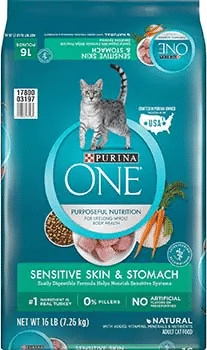
Conclusion
They require good quality, protein-based food packed with vitamins and minerals to ensure they stay healthy. Cats’ stomachs are very sensitive, so they need decent quality food. Vomiting and diarrhoea can be caused by eating the wrong food. Besides causing dry skin, it can also lead to poor coat quality.
As far as cat food for sensitive stomachs goes, we recommend Smalls Fresh Ground Cow Raw Cat Food. However, if you’re on a tight budget, Cat Chow Sensitive Stomach Gentle Dry Cat Food is a reasonable option with decent moisture and protein.
You can find the best sensitive stomach cat food by reading our reviews and guide.
FAQs
For cats with sensitive stomachs, what is the best food?
A low-carb, high-protein canned food diet may be more suitable if your cat is experiencing stomach sensitivity to dry food, such as Royal Canin Veterinary Diet Gastrointestinal Moderate Calorie canned cat food or Purina Pro Plan Veterinary Diets EN Gastroenteric Formula canned cat food.
What is food intolerance in a cat?
You may notice some of the following signs if your cat has food allergies or food intolerances:
- Diarrhoea or vomiting.
- Defecation.
- A tendency to scratch or lose hair frequently.
- Skin that is red and inflamed.
- There is a chronic problem with the ears.
- There is a slow growth rate in young cats.
- Sneezing, coughing, and wheezing.
What protein is best for cats with sensitive stomachs?
Cats with sensitive stomachs often have trouble digesting certain proteins. This can lead to vomiting and other digestive problems.
There are a few options for protein sources that cats with sensitive stomachs can eat. These include eggs, turkey, and chicken. Fish is also an option, but it may not be the best one for cats with sensitive stomachs because it has a higher fat content than the other protein sources.
For more inquiries, you can contact us!
